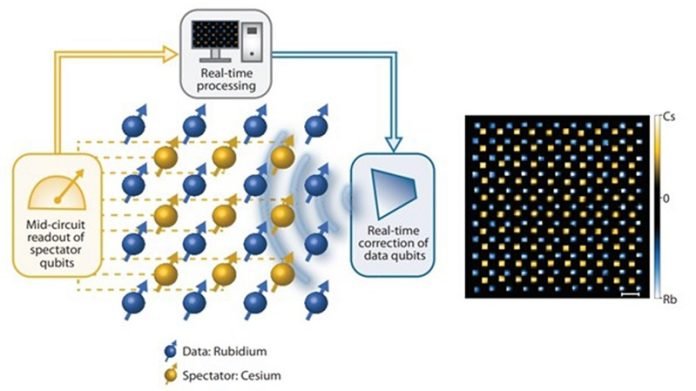
Quantum computers can do tasks much faster than regular computers.
Still, they’re very sensitive, and things like changes in temperature, pressure, or magnetic field can mess up their workings.
But scientists at the University of Chicago’s Pritzker School of Molecular Engineering have found a new way to tackle this problem.
They’ve used what they call “spectator qubits” in the quantum system. Qubits are like tiny computer bits, but they work differently in quantum computers.
Usually, they store data, but these “spectator” ones only monitor the noise or disturbances around. It’s like when you use noise-canceling headphones, which listen to the noise around you and then play the opposite noise to cancel it out.
Assistant Professor Hannes Bernien, who is in charge of the research, said this new method can improve the data’s quality in the quantum computer, a lot like how noise-canceling headphones improve the quality of the music you’re listening to.
One problem with quantum computers getting bigger is that they become even more sensitive to noise and disturbances, causing more errors. When scientists try to measure a qubit to see how much noise it has encountered, it can collapse and lose its data, making it a very challenging problem.
The concept of using spectator qubits was suggested by theoretical physicists. They don’t hold any crucial data but stay inside the quantum computer, behaving like the microphone in noise-cancelling headphones.
But instead of detecting sound waves, these spectator qubits notice any changes in the environment that can mess with the qubits.
Bernien’s team has tested this theory in a quantum computer that uses neutral atoms. Neutral atoms are atoms that are not charged and are held in place by laser beams, acting as qubits. Bernien’s team managed to use two kinds of atoms, rubidium and cesium, to act as data qubits and spectator qubits, respectively.
The rubidium atoms store data while the cesium atoms monitor noise.
They managed to get the system to respond quickly to changes in the rubidium atoms based on the real-time data from the cesium atoms.
To test this, they exposed the quantum system to magnetic field noise, and the cesium atoms detected this noise. Their system then canceled out the noise in the rubidium atoms in real-time.
The team is excited to improve this system’s sensitivity and test it against more noise types and amounts. Eventually, Bernien hopes to have spectator qubits running all the time in the background of any neutral atom quantum computer to minimize errors, making these computers even more powerful and efficient.
The study was published in Science.



